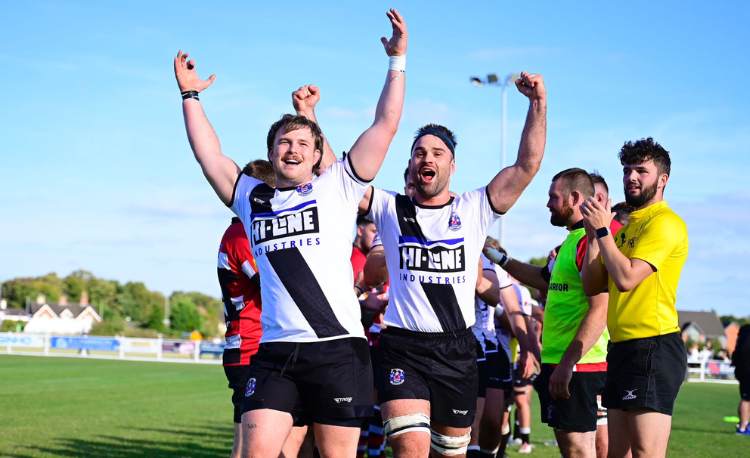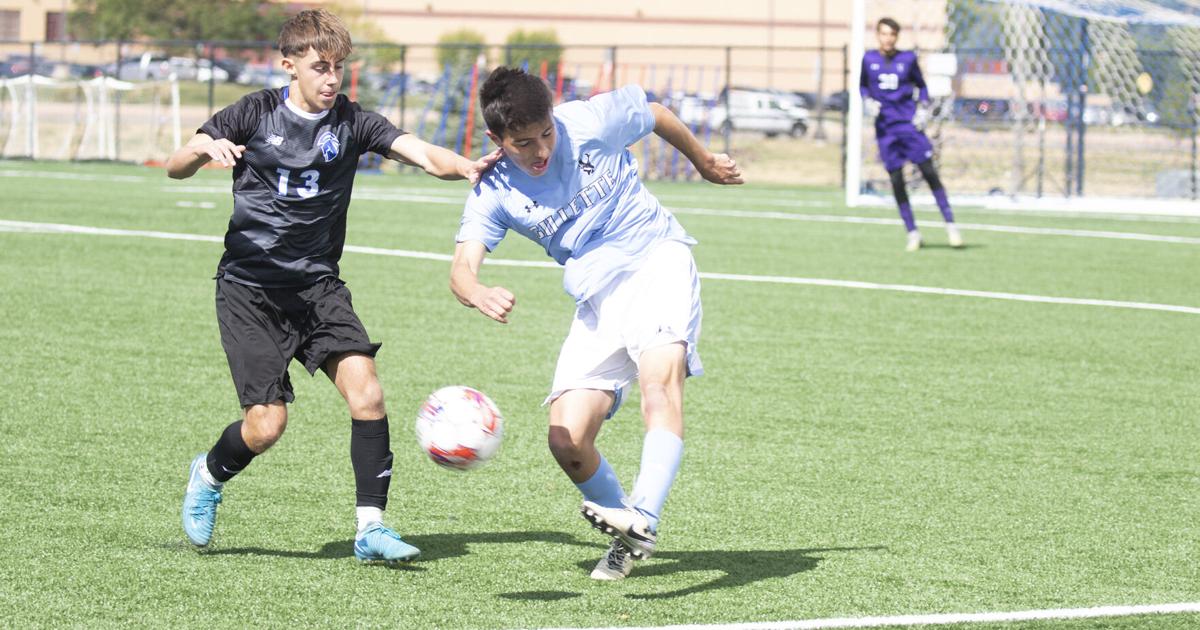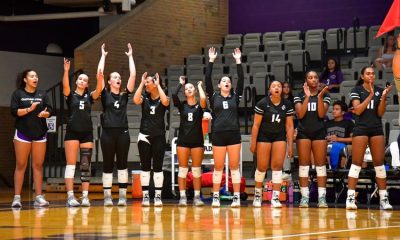Pope Francis girls’ soccer standout Maeve Turmel announced via Instagram last week about her verbal commitment to play Division I soccer at Stonehill College after graduation next spring.
It was a dream come true for Turmel.
It’s not just about skill development, it’s about building mental resilience, fostering a sense of belonging, and encouraging a mindset that sees every challenge as an opportunity to get better. Remember: ’We don’t lose, we learn’. Improvement, however, takes time. The way players approach learning, and the atmosphere created around that process, plays a huge […]



Improvement, however, takes time. The way players approach learning, and the atmosphere created around that process, plays a huge role in how well they develop.
Belonging is essential to the cohesion, motivation and resilience of sports teams, creating a foundation for trust and collaboration.
5. Make learning enjoyable
In a team environment, this means reframing setbacks not as signs of failure, but as opportunities for growth.
To stay competitive, players and coaches must continually improve on the field, in the gym, and in their minds.
1. Foster psychological safety
2. Encourage a growth mindset
Training sessions should incorporate elements of fun, creativity and challenge to keep things fresh.
At Burton, we have started a new initiative called the ’Heritage Huddle’.
However, simply setting easy or vague goals doesn’t foster real growth. Setting Specific, Measurable, Attainable, Relevant, and Time-bound (SMART) goals challenges players to stretch their abilities and keeps them focused on what’s most important.
Dweck’s research on mindset adds another layer, suggesting that environments fostering a growth mindset, where team members see skills and qualities as improvable, further strengthen this sense of belonging.
The key is to ensure that they are motivating, achievable and always tied back to individual and collective improvement.
In a sport where physical strength, tactical intelligence and mental resilience are paramount, one essential factor often gets overlooked: creating a positive environment for learning.
The role of leadership – whether that is coaches, or senior players – is to model these behaviours.
Rugby is a dynamic and complex sport that requires constant evolution. Techniques, strategies, and even the mindset needed to succeed, are always changing.
It is important to celebrate goals that have been achieved. This reinforces motivation, builds confidence, and acknowledges the hard work invested.
To build a successful team, coaches and other staff, as well as players and supporters, should all embrace a growth mindset.
So, how do we create a positive learning climate in rugby?
7. Belonging
Players who enjoy their work will invest more energy and passion into their development, ultimately benefiting the team.
Educational expert Peps McCrea has discussed how belonging fosters a shared identity, shaping behaviours and attitudes that lead to higher levels of commitment and performance. Identity could be as simple as a collective uniform.
Building a positive learning climate requires patience and consistency.
When players feel safe to experiment and challenge themselves, they are more likely to take risks and push their limits.
We host our own ’Great Burton Bake Off’, where players are randomly selected over two months to bring a homemade treat to training.
Team-mates have an opportunity to learn from each other. Whether it’s an experienced player sharing insights with a less experienced one, or a young player bringing fresh ideas to the table, collaboration among players strengthens the team.
These interactions often lead to innovative solutions to problems and can build stronger bonds between team-mates, which is crucial for both individual and team success.
A player who fails at a specific task doesn’t have to see it as a permanent limitation, but rather a part of the learning process.
But goals should also be fluid. As players and teams progress, goals should evolve and adapt.
True competitors are players who consistently bring out their best possible performance, time after time.
Together, these insights show that a strong sense of belonging can improve individual performance, and also elevate the team’s collective strength, enabling players to thrive and pursue shared goals with dedication.
Performance coach Owen Eastwood, who specialises in team culture, emphasises belonging from a cultural perspective, drawing on the Māori concept of whakapapa, or shared ancestry, which creates a deep-rooted connection among team members.
Athletes who believe they can grow within their team are more likely to stay motivated, embrace challenges, and develop a stronger bond with their team-mates.
By cultivating a positive climate for learning, coaches, players, and teams can achieve more than just wins – they can create a culture of improvement that will last long after the season ends.
Goals are the blueprint for development – without clear targets, players may lack direction or motivation.
Consistent communication, continuous reinforcement of expectations, and providing steady feedback ensures that learning becomes part of the team’s DNA.
Here are some key principles that we try to follow at Burton RFC, who play at level 5 (Regional 1 Midlands), and how we try to cultivate an environment where players feel safe, inspired, and driven to grow.
I use research from sports psychologist Dan Abrahams, and strive to be transparent with the players, to let them know that our performances can’t always be 10/10.
And, ultimately, that is what separates good teams from great ones.
Learning can be tough, and rugby is demanding, but players are far more likely to stay engaged if they enjoy the process.
In doing so, players will trust the process and know that success is built upon a foundation of hard work, learning, and resilience.
A positive learning climate requires coaches and players to be aligned on what they want to achieve. This could be mastering a particular skill, improving fitness levels, or refining game strategy.
Progress may not always be linear. There will be plateaus, setbacks and frustrations along the way.
Enjoyment extends beyond the pitch, with activities like themed socials, or ’bring your dad on the bus’ weekends.
This is where we invite former players to deliver pre-match talks, sharing their personal experiences and memories as Burton RFC players.
When individuals feel genuinely part of a group, they naturally align with that group’s norms and goals, which can encourage consistent efforts and mutual support, especially under challenging circumstances. This is particularly important for sports teams.
According to Eastwood, athletes who feel connected to their team’s legacy and culture experience a sense of responsibility to uphold and contribute to it, often leading to higher resilience and a shared drive to succeed.
For example, a motto we use at Burton is: “We don’t lose, we learn”. We have had some pretty heavy losses according to the scoreboard, but it has given us an opportunity to learn, whether that be about our preparation or execution.
When we talk about creating a positive climate for learning, we must not forget one essential element: enjoyment.
A growth mindset emphasises effort over talent, resilience over perfection, and process over outcomes.
Learning isn’t just about picking up new skills; it’s about unlearning bad habits, experimenting with different approaches, and fostering a growth mindset that embraces mistakes as stepping stones to mastery.
A coach or leader who fosters psychological safety creates an atmosphere where players know that errors are part of the journey, not the end of it.
This term, popularised by psychologist Carol Dweck, refers to the belief that abilities and intelligence can be developed over time, through effort, practice and persistence.
The ability to cultivate a culture where learning is encouraged, embraced and celebrated can be the game-changer that drives personal and team success.
However, by consistently reinforcing positive behaviours and offering support, players will start to internalise the principles of learning and improvement.
4. Promote peer learning and support
By shifting our mindset from a fear of failure to a hunger for learning, we stay motivated and engaged.
It is more than just a pre-match talk, it’s a way to connect generations of Burton RFC players and supporters, ensuring our rich history continues to shape our future.
This is one of the most effective ways to reinforce a positive learning climate.
Mistakes – like a missed tackle, a poorly executed pass, or an offside penalty – are inevitable. They are also the best teachers.
6. Be patient and consistent
These sessions aim to inspire our current squad, foster a sense of belonging for new players, and strengthen the bond between the team and our wider club community.
Moreover, learning from others engenders mutual respect and can help to break down any barriers that may exist between players of different levels of experience or skill within a team.
They’re the ones who push for a 6/10, when 5/10 seemed likely, and those who manage 7/10, even when a 5/10 would have been understandable.
An enthusiastic, energetic environment that celebrates learning moments (and winning bakes!) creates a culture of positivity.
We have also set up our own ’Ally Pally’, with an ongoing darts competition, all of which adds to the fun and camaraderie within the team.
This includes constructive feedback, open discussions about what went wrong and how to improve, and a willingness to support players when they fail.
Celebrations not only boost individual morale, but also strengthen team unity, as players come together to honour shared success.
Coaches and senior players should encourage knowledge sharing, and create spaces for informal discussions and feedback.
Creating a culture where learning is not only accepted, but actively encouraged, is foundational to the success of any team.
Players need to feel that they can make mistakes without fear of ridicule or punishment.
FAIRBORN — The Class of 2025 has been announced for the Fairborn Community Schools Athletic Hall of Fame. Eight individuals and one team make this year’s group, with inductees ranging from 1948 to 2017 as members of the Fairborn community. The individuals being inducted include Brandon Easterling, Fred Domicone, Greg Foliano, Kerry Reeser, Madison Musick […]


FAIRBORN — The Class of 2025 has been announced for the Fairborn Community Schools Athletic Hall of Fame.
Eight individuals and one team make this year’s group, with inductees ranging from 1948 to 2017 as members of the Fairborn community.
The individuals being inducted include Brandon Easterling, Fred Domicone, Greg Foliano, Kerry Reeser, Madison Musick Murphy, Mike Lynch, Roger Pitstick and Wayne Campbell. The 1978 Baker soccer team also is included.
Hall of Fame weekend will take place on Aug. 29. A reception will be held at 5 p.m. in the Great Hall at Fairborn High School, and will be followed by the enshrinement ceremony at 6 p.m. in the Performing Arts Center. The members of this year’s class will then be introduced to the crowd during halftime of that night’s football game hosting Sidney.
Here is more on this year’s inductees:
Wayne Campbell — Fairborn Park Hills H.S. — Class of 1976 — Basketball, Baseball
Five time letterman, 3 in basketball, 2 in baseball.
In the 1974 basketball season he was the team MVP, the leading scorer with 31 points in one game and made 10 consecutive free throws in another. Voted 2nd team All-Mad River Valley League. In 1976, competing in the Miami Central Conference he was top 10 in scoring.
Baseball career he was a pitcher and first baseman. Team MVP in 1975. Area performance award as outstanding pitcher. Set Park Hills strikeout record, and school district record of 1.03. Era, with a .500 batting average. His senior season 1976; led PHHS to 16 wins and semi-finalist in the district tournament and was 1st team all MCC.
Wayne was the youngest player chosen to play with the AA Dayton Dodgers.
College career at University of Dayton lettering 3 years throwing a no-hitter vs Wright St. Set U.D. records in ERA, strikeouts, complete games and was team MVP. An unfortunate arm injury ended his pro prospects.
He’s also enshrined in the Dayton Amateur Baseball Hall of Fame.
Fred Domicone — Fairborn Park Hills H.S. — Class of 1978 — Football, Track, Wrestling
Fred Domicone lettered 3 times in football and one in track/field.
In football he played offensive/defensive lineman and special teams. Playing on the 1976 Park Hills, (9-1)Miami Central Conference Champions. That nine win season still stands as the best season record in district history.
Individual honors include; All MCC offensive lineman in ‘76, ‘77. Honorable mention All-Area 1976. In 1977 first team; All-Area, All Southwest District, honorable mention All-State.
Football team awards; Captain ‘77, offensive lineman award, “Fred Whitt Annihilator” award.
College career at the University of Dayton where he letter three seasons as an offensive linemen. Starting on UD’s Div.II National Champions in 1980 and runners-up in 1981.
Fred is the entrepreneur in Fairborn of; Domicone Printing and Jubie’s Creamery.
Brandon Easterling — Fairborn H.S. — Class of 2017 — Football, Basketball, Track/Field
Brandon Easterling won 10 letters; 4 in football, 3 each in basketball, track/field.
Serving as team captain in football. Brandon played receiver/defensive back and was a 3 time first team GWOC So. Div.; 2 time first team All GWOC. All state 2nd team defensive back, AP All Southwest District and AP All Ohio.
Set school records for tackles in a game (28), receptions in a game (16), receptions in a season (68), receptions in career (142), tackles in a season (131).
He was a key contributor in basketball for the 2016 GWOC Championship team. Earned GWOC So. Div. honorable mention in 2017.
Played football at the University of Dayton and was a 2 time team captain and 1st team AP All American. Twice first team Pioneer League.
Greg Foliano — Fairborn Baker H.S. — Class of 1981 — Football, Wrestling, Track
Greg Foliano is a seven time letter winner; three each in football and wrestling, 1 in track.
A two way starter on the offensive and defensive line. As a senior leading the team to a 7-3 record; winning a coaches award and first team All-Miami Central Conference and Second team All-Greater Dayton.
Wrestling as a junior, he was runner-up in the MCC tournament, qualified for the district placing third and a state qualifier as the team was the MCC, Sectional and Southwest District champions.
Helping the team repeat as MCC champs his Senior year. He compiled a 37-3 match record with 17 pins; 8-0 in dual meets, MCC and Sectional champion, third place in the state. Highest state wrestling placement in school history at that time. Named to the Dayton Daily News All Area First Team.
United States Wrestling Federation Free style Ohio state champion (80-81). 1980 A.A.U. Jr. Olympic, Ohio state champion.
Four year college letter winner (three yrs Miami (O), team captain (Jr./Sr.) M.A.C. heavyweight runner-up as junior.
Mike Lynch — Fairborn Baker H.S. — Class of 1980 — Soccer
Mike Lynch was a 3 year lettermen, team captain as a Senior. All-Miami Central Conference (78,79), All-Ohio (78,79). Ohio South Olympic Development Program, Team Captain, Region II Camp Pool (79).
Lynch played college soccer at the United States Air Force Academy, earning all-league and all-region accolades and served as Team Captain his senior year. After graduation, he competed for the active duty USAF Soccer Team in 1984 and 1985, and was selected to the United States Armed Forces National Team in 1984. Lynch has been heavily involved in youth soccer since 1985, coaching Olympic Development Program (ODP) and select club soccer teams in Ohio, Colorado, Missouri, Nebraska, and North Carolina.
Assistant coach men’s soccer at FHS (1985-88). College coaching career at Truman St, Nebraska Wesleyan and currently women’s head coach at Belmont Abbey College starting in 2011. Team was league champions (2015); tournament champions (‘12,’14); North Division Champion 2023. Conference coach of the year 2015.
Madison Musick Murphy — Fairborn H.S. — Class of 2011 — Basketball, Golf
Madison Musick Murphy is an eight time letter winner with 4 each in golf and basketball.
She was member of the Greater Western Ohio Conference, South Division basketball team champions and Sectional champions in 2010 and 2011.
As a golfer she is the holder of many achievements in G.W.O.C. So. Div.
2007, So. Division 2nd team.
2008,09,10, So. division, 1st team.
G.W.O.C Conference Awards:
2009,10 first team All G.W.O.C. 2009,2010 GWOC Athlete Golfer of the year.
2010 G.W.O.C. Champion.
She helped lead the team to four straight sectional qualifications to the district.
She never lost a match her final two years going 28-0. Madison holds all the girls FHS golf records, individual and team; 9,18 hole and average.
Played college golf at Ashland University and played in two national championships. She was Ohio Women’s Amateur runner-up in 2014.
Roger Pitstick — Osborn-Bath H.S. Flyers — Class of 1948 — Football, Track/Field
Roger Pitstick was a multiple letter winner in football and track/field.
He was a football running back, defensive back and team captain on the 1947; 8-1, Bath Flyers Little Six League champions. The 8-1 record was the most victories in a season until 1976.
Track/Field he excelled in the pole vault; capturing two Little Six pole vault titles and a District championship, qualifying for the Class A state meet where he placed second, in 1948. He placed third in the state class B pole vault in 1947. Honored as track team captain on the ‘47 and ‘48 Bath H.S. Little Six Champions.
Kerry D. Resser, Jr. — Fairborn Baker H.S. — Class of 1982 — Football, Basketball, Track
Kerry Reeser is a seven time letter winner. Three in football, 2 each in basketball and track.
Featured at running back he helped the team to two 7 win seasons in (80, 81). The 1981 record of 7-2-1 was the best FHS Flyers and Baker Flyers era team record for a 10 game season at the time.
Team captain and MVP as a senior; rushing for 1,574 yds. in 246 carries. He remains the school record holder in rushing yards at 1,574 yds in a season and 3,446 career rushing yards. Also tied for the modern day record of 6 touchdowns (30 points) scored in one game. Combined rushing, receiving, yardage of 3,867.
All-MCC 1st team (80,81), 2nd team All-Ohio 1981, first team Dayton Daily News All-Greater Dayton 1980; second team 1981. Football scholarship to Miami of Ohio.
He played on the 1981 Baker MCC co-championship basketball team.
Fairborn Baker 1978 Men’s Soccer Team
The 1978 Fairborn Baker H.S. Men’s Soccer team achieved a 15-3 record; which is still the best season record in district history. State ranking of 14, rising as high as 8th, late in the season. Coach David Gardner’s men finished second in the Miami Central Conference. Out scoring their opponents 85-23.
Team: West Anderson, Jim Aker, Doug Boney, Henry Chmielewski, Kevin Cieply, Mike Curtis, Greg Dierker, Mike Eviston, Pete Flick, Larry Halbert, Jeff Haughey, Mike Lynch, Ken McCarthy, Mike Mantei, Chris Moyer, Ed Murray, Ted Myers, Carl Planchon, Doug Risk, Mike Stroud, Mike Wager, Pat Weaver, Dave Wilhelm, Dave Winans.
Trainer; John Carter; Statisticians; Teresa Mantei, Jeannamarie Cox.
Contact Steven Wright at 937-502-4498 and follow on X (formerly Twitter) @Steven_Wright_. Bios provided by Craig Moore.
Ostrowski HOUGHTON — Michigan Tech Huskies soccer coach Melissa Kuhar has named A.J. Ostrowski an assistant coach with the Huskies. Ostrowski comes to Houghton with over a decade of coaching experience including serving as the FCX travel soccer club coach and guiding UPSL affiliate Chicago Nation FC for three years from 2021-23. “I am extremely excited to have A.J. joining […]



Ostrowski
HOUGHTON — Michigan Tech Huskies soccer coach Melissa Kuhar has named A.J. Ostrowski an assistant coach with the Huskies.
Ostrowski comes to Houghton with over a decade of coaching experience including serving as the FCX travel soccer club coach and guiding UPSL affiliate Chicago Nation FC for three years from 2021-23.
“I am extremely excited to have A.J. joining my staff here at Tech,” she said. “It was a long process to find the right fit for our program, and I believe I hit a home run with this hire. He is going to be a huge addition for the program and help us continue to grow both on and off the field.
“A.J.’s soccer knowledge paired with his outgoing personality, strong set of values, and his love for the game will fit right in with the goals we look to accomplish heading into the 2025 season and beyond. I am thrilled to also welcome his wife, Caitlyn, and daughter, Keeley, to the MTU soccer family.”
“I am very blessed and buzzing to be the next addition to the Michigan Tech athletic family. I am truly grateful for the opportunity to grow under women’s soccer head coach Melissa Kuhar, as well as athletic leadership minds Dr. Suzanne Sanregret, Joel Isaacson and Rhys Edwards,” said Ostrowski. “From the moment my family and I came to campus, we just knew this was our next home. With the academic and athletic reputation of Michigan Tech being second to none, alongside having a family oriented community tightly integrated within the fibers of the school, it made moving to Michigan Tech the best choice for me and my family.
“I am especially excited to bring energy, passion, and soccer prowess to our student athletes as we strive for the Husky way of ‘quiet confidence’ in our humble pursuit of cultivating a winning culture through hard work and determination.”
Ostrowski graduated from Carthage College in 2017 with a bachelor’s degree in sports and exercise science with a minor in education as well as having a CONCACAF C License. He served as a teacher and age group coordinator for the FCX Travel Soccer Club, where he coached from 2015-25.
He was the head coach for Chicago Nation in the UPSL, leading the team to deep playoff runs in 2021, 2022 and 2023, capped with a third-place national finish representing the USA in the UPSL Champions Cup against Mexico in 2023.
Additionally, Ostrowski was an assistant coach for Barrington, (Illinois) High School girls soccer team during their state championship run in 2017-18.
At the collegiate level, he was a part of the Carthage College men’s soccer program, contributing to three NCAA playoff berths, two CCIW titles, and the first NCAA tournament win in school history. He also served as an assistant coach for the team during the 2015-16 season following his playing career.
His duties at Michigan Tech began in the beginning of July.
GRAND FORKS — A trial date has been set for the Title IX lawsuit brought forth by former UND women’s soccer coach Chris Logan against UND. The jury trial is scheduled for 9:30 a.m., May 11, 2027, in Fargo before Chief Judge Peter Welte. The trial is estimated to last five to seven days. ADVERTISEMENT […]


GRAND FORKS — A trial date has been set for the Title IX lawsuit brought forth by former UND women’s soccer coach Chris Logan against UND.
The jury trial is scheduled for 9:30 a.m., May 11, 2027, in Fargo before Chief Judge Peter Welte. The trial is estimated to last five to seven days.
ADVERTISEMENT
The original complaint — Logan claims employment retaliation for raising gender equity concerns — was submitted April 16, with UND’s legal response filed May 22. The trial date was established on June 27.
UND’s four-page legal response includes a line-by-line address of Logan’s original complaint, denying the allegations. The legal response is signed by North Dakota Attorney General Drew Wrigley and assistant attorney generals Courtney Titus, Jane Sportiello and Grant Ellenson.
UND’s legal response ended by requesting the case be dismissed.
“Defendant respectfully requests that Plaintiff’s Complaint be, in all things, dismissed with prejudice and Defendant be awarded costs, disbursements, attorney’s fees, and any other relief the Court deems just and equitable,” the document said.
According to the original complaint, Logan alleges he was “wrongfully terminated after reporting gender-based discrimination in athletic facilities and programs and participating in a Title IX investigation into those inequities.”
The lawsuit claims Logan’s dismissal — his contract expired and was not renewed — resulted in “significant harm to his career, reputation and emotional well-being.”
The lawsuit outlines specific critiques of UND’s playing surface at Bronson Field, alleging it failed to meet NCAA recommended dimensions of 120 yards by 75 yards, as well as “safety hazards, including significant declines at field edges, a deep embankment near the goal creating safety concerns, and a northwest side decline making corner kicks nearly impossible.”
ADVERTISEMENT
In Logan’s eight seasons at UND, the Fighting Hawks were 51-68-24 overall and 21-41-12 in conference play.
Last season, Logan’s final year at UND, the Hawks went 4-8-6 overall and 0-4-4 in Summit play.
UND gave Logan a two-year extension in November 2022. After the extension, the Hawks won one of 16 conference games in two seasons (1-7-8) and missed the Summit League tournament both years.
On Jan. 3, 2025, UND named Henrik Sohn, who had been Logan’s assistant coach last season, as the next head coach of the Hawks.
On Feb. 20, 2025, Minot State announced Logan as the next head coach of the Division II program.
On Nov. 26, 2024, one day after UND announced it wouldn’t renew Logan’s contract, the Herald released a story in which Logan claimed the Title IX investigation resulted in his non-renewal.
Within the Herald story, UND spokesman David Dodds said: “The decision announced Monday regarding Chris Logan was made independent of and is not connected in any way to any ongoing internal review involving the UND soccer program. We have nothing further to add as we do not typically comment on employee personnel matters apart from what is stated in university public releases.”
For the Gillette College men’s soccer team, everything is pretty much new as it heads into the upcoming season. 0



For the Gillette College men’s soccer team, everything is pretty much new as it heads into the upcoming season.
Story Links CLINTON, S.C. – Presbyterian College women’s soccer head coach Matt Smith has formally announced the hiring of a new assistant to the Blue Hose program, bringing in South Carolina native Bradley Anderson. Anderson – originally from Lexington and former assistant with the PC men’s soccer team in 2022 – returns to Clinton after […]



CLINTON, S.C. – Presbyterian College women’s soccer head coach Matt Smith has formally announced the hiring of a new assistant to the Blue Hose program, bringing in South Carolina native Bradley Anderson.
Anderson – originally from Lexington and former assistant with the PC men’s soccer team in 2022 – returns to Clinton after more recent stops at his alma mater Erskine and Spartanburg Methodist.
“I’m excited to have Bradley join our staff”, remarked Smith, who helped deliver Presby’s highest win count in six seasons last fall. “He is a young coach with a high level of soccer knowledge. His energy is infectious and he will be a huge piece of getting this program to where we want it to be.”
Commented Anderson, “This opportunity represents much more than a coaching role, it is a chance to contribute meaningfully to the development of student-athletes within a program and institution that align with my values.”
“I want to thank Coach Matt Smith and Athletic Director Dee Nichols for trusting me within this role. I look forward to working alongside a passionate staff to help our student-athletes thrive on the field and in all aspects of their lives. I’m excited for the journey ahead. Go Blue Hose!”
Anderson has already coached two separate double-digit win seasons in his blossoming career at the college level, coaching 11 combined all-conference players at PC and Spartanburg Methodist.
SPARTANBURG METHODIST (2024)
Last fall, Anderson roamed the sideline for SMC where they witnessed an 11-5-1 mark. The Pioneers got the victory in all but one of their six home matches, finishing fourth in the Continental Athletic Conference.
Spartanburg Methodist carried a seven-match winning streak in the first half of the season, acquiring four clean sheets in that period.
For their efforts, SMC landed three student-athletes on the All-CAC Second Team list, while three others were named Honorable Mention. Caitlin Lagos was chosen as the conference’s Champion of Character to conclude the year.
ERSKINE (2023)
Prior to his most recent gig at Spartanburg Methodist, Bradley spent the 2023 campaign back at his alma mater in Due West. He’d spend that lone season at the same school where he was a part of 26 total wins as a student, going as far back as six years prior.
Anderson’s coaching credentials at Erskine included a team GPA well above the 3.0 mark, as well as maintaining all players on the roster for the ensuing season.
PRESBYTERIAN MEN’S TEAM (2022)
Three years ago, Anderson made his Presbyterian debut under then-head coach Jonathan Potter for the ’22 season. PC went unbeaten in games played at Martin Stadium that year (6-0-2), qualifying for the Big South Tournament after an overall record of 10-5-2.
The Blue Hose were chosen for a weekly award by the conference on six occasions that semester, with Lorenzo Nagy finishing the year as an All-Big South First Team representative.
Carson Griffith and Nacho Gallego followed on the all-league Second Team unit, not to mention Nile Nguidjol as Honorable Mention and Leo Stritter making the Big South All-Freshman Team.
GREENWOOD & A.C. FLORA HIGH SCHOOL (2017-24)
Anderson’s contributions to soccer extend well beyond the collegiate level, spending numerous seasons assisting the boys’ programs for the Greenwood Eagles and A.C. Flora Falcons.
In one season at A.C. Flora, Anderson’s group captured a Region One 4A title and sent six players to All-Region status. He also directed three Region One 5A Championship teams at Greenwood, mentoring student-athletes that went on to play Division I, Division II, NAIA, and Community College.
CLUB VENTURES
For the past six years, Anderson has served as the head men’s and women’s soccer coach for the Lakelands Toros club team based in Greenwood, coaching to three league championships and two open cup crowns in the process.
Additionally, he was named the President of Emerald City FC (another organization out of Greenwood) in July 2023, a title that he still holds.
Anderson holds a C License from the United States Soccer Federation.
PLAYING CAREER & EDUCATION (2017-23)
Anderson’s upperclassman seasons at Erskine were stories to remember, winning 17 total contests over that span and nearly making the NCAA Division II national tournament on both occasions.
The 2019 season – Anderson’s junior year – was a breakout moment for the Flying Fleet, going 7-3 in Conference Carolinas action on their way to 10 overall wins. They’d make it to the league championship match, ultimately falling to Limestone.
Following the COVID-19 pandemic, Bradley’s senior season was delayed until the spring of 2021, an abbreviated campaign where Erskine managed a 7-1 mark and an unblemished regular season record (6-0). Erskine’s only loss all season came in the CC Tournament, eliminated by Belmont Abbey.
Anderson received a Bachelor’s degree in Health Sciences at Erskine College (2021). He’d follow up with a Master of Science diploma in Athletic Coaching at Columbia College in 2023.
Chicopee Comp vs Pope Francis Prep girls Soccer 10/2/23. Pope Francis No.22 Maeve Turmel, is introduced to the crowd at Pope Francis High School Field. photo by J. Anthony Roberts Pope Francis girls’ soccer standout Maeve Turmel announced via Instagram last week about her verbal commitment to play Division I soccer at Stonehill College after […]



Pope Francis girls’ soccer standout Maeve Turmel announced via Instagram last week about her verbal commitment to play Division I soccer at Stonehill College after graduation next spring.
It was a dream come true for Turmel.
If you purchase a product or register for an account through a link on our site, we may receive compensation. By using this site, you consent to our User Agreement and agree that your clicks, interactions, and personal information may be collected, recorded, and/or stored by us and social media and other third-party partners in accordance with our Privacy Policy.


Why a rising mid-major power with an NCAA Tournament team opted out of revenue-sharing — and advertised it


New 'Bosch' spin


EA Sports College Football 26 review – They got us in the first half, not gonna lie


Volleyball Releases 2025 Schedule – Niagara University Athletics


E.l.f Cosmetics Builds Sports Marketing Game Plan Toward Bigger Goals


CAREGD Trademark Hits the Streets for Mental Health Month


Will LeBron James request a trade? 🤔 Windy says MULTIPLE TEAMS would make offers 👀 | NBA Today


Buford DB Tyriq Green Commits to Georgia


Will Giannis DEPART Milwaukee⁉️ + How signing Turner & waiving Dame impacts the Bucks | NBA Today


New NCAA historical database provides wealth of information on championships